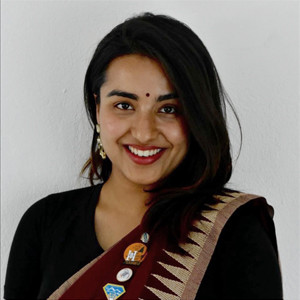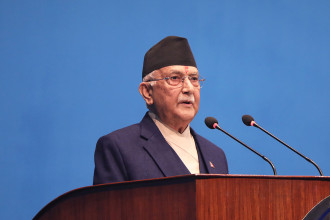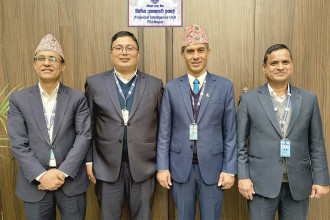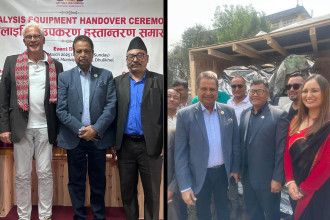-1708246476.jpeg)
KATHMANDU: Dozens of events are currently taking place as part of the ongoing World Social Forum 2024, attracting thousands of individuals from various sectors. These events stimulate debates on pressing global issues, ranging from climate change and social justice to development, democracy, and empowerment.
-1708246477.jpeg)
-1708246478.jpeg)
The programme, which plans to conduct a variety of activities under themes such as economic inequality and justice; gender, sexualities, identities, and all forms of discrimination; communication, social networks, and media, is currently underway. It was also announced that the Intercontinental Youth Forum, involving 10,000 young people worldwide, is taking place from February 17 to 19 under the slogan 'Another World is Possible'.
An event titled 'Unseen and Unheard: The challenges and Victories of Home Based Workers in South Asia' was held to address key issues and challenges faced by Home-Based Workers (HBWs) in South Asia. This event witnessed participation from more than a hundred HBWs from Nepal and featured speakers including HomeNet South Asia Regional Coordinator Sristi Joshi Malla, HomeNet South Asia Enforcer Chadani Joshi, Trade Union Congress/ Joint Trade Union Coordination Center Chair Yogendra Kunwar, ILCO National Project Co-ordinator Bandana Aryal, UN Women Economic and Security Rights Programme Specialist Santosh Achaya, Bagmati Province Parliamentarian Bindu Shrestha, HomeNet Pakistan Executive Director Ume Laila Azhar, Brand-Ambassador Sadichha Shrestha, and Home Based Workers Concerned Society Nepal coordinator Prabha Pokharel as a master of ceremony.
Bhagwati Gautam, a representative from Saathi Sanstha, highlighted the impact of climate change on HBWs and their products. She shared examples of how unexpected climatic changes have led to food discolouration and premature product damage. She urged the government and all stakeholders to provide training to those lacking resources to mitigate the problems caused by climate change.
Shanti Maharjan, another speaker, shared her experiences of how women HBWs are often mistreated due to their gender. She recounted instances where women were denied permission to sell food on the grounds of low quality. "People often distrust and doubt the work performed by women HBWs. Even government officials have been unethical and harassed women HBWs," she said.
Chadani Joshi sent a video sharing her insights and stressed the importance of conducting events like the World Social Forum, which focuses on the unheard challenges and victories of HBWs in the region. She stated, "If patriarchy is a barrier to women HBWs, we should fight against it and not remain silent. You must be seen and heard. The government must feel the value of HBWs and recognise their importance in supporting the global economy."
-1708246477.jpeg)
-1708246476.jpeg)
-1708246480.jpeg)
She further encouraged learning from countries like Pakistan, which have managed to draft policies after years of struggle.
Ume Laila Azhar, in her speech, shared the historical policy revolution of HBWs in Pakistan. She said, "We fought for 17 years. Starting from 2000, we finally got approval of the drafted National policy and became the first country to make one."
She shared her insights on advocating for policy-level changes and encouraged the chanting of slogans such as 'We are workers', 'We are many', and 'We are together'.
-1708246481.jpeg)
Santosh Acharya from UN Women stated, "When we talk about the economic empowerment of women, we must not forget the social and environmental aspects associated with it. A woman can never rise until she is supported by her family and society. Nepal must understand that gender roles are creating a barrier for women to be economically empowered."





-1743399264.jpg)
